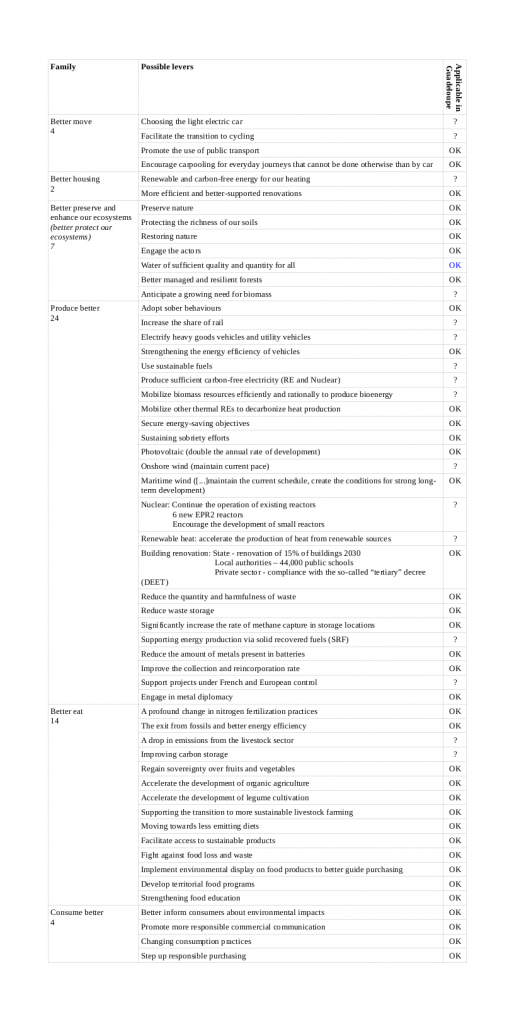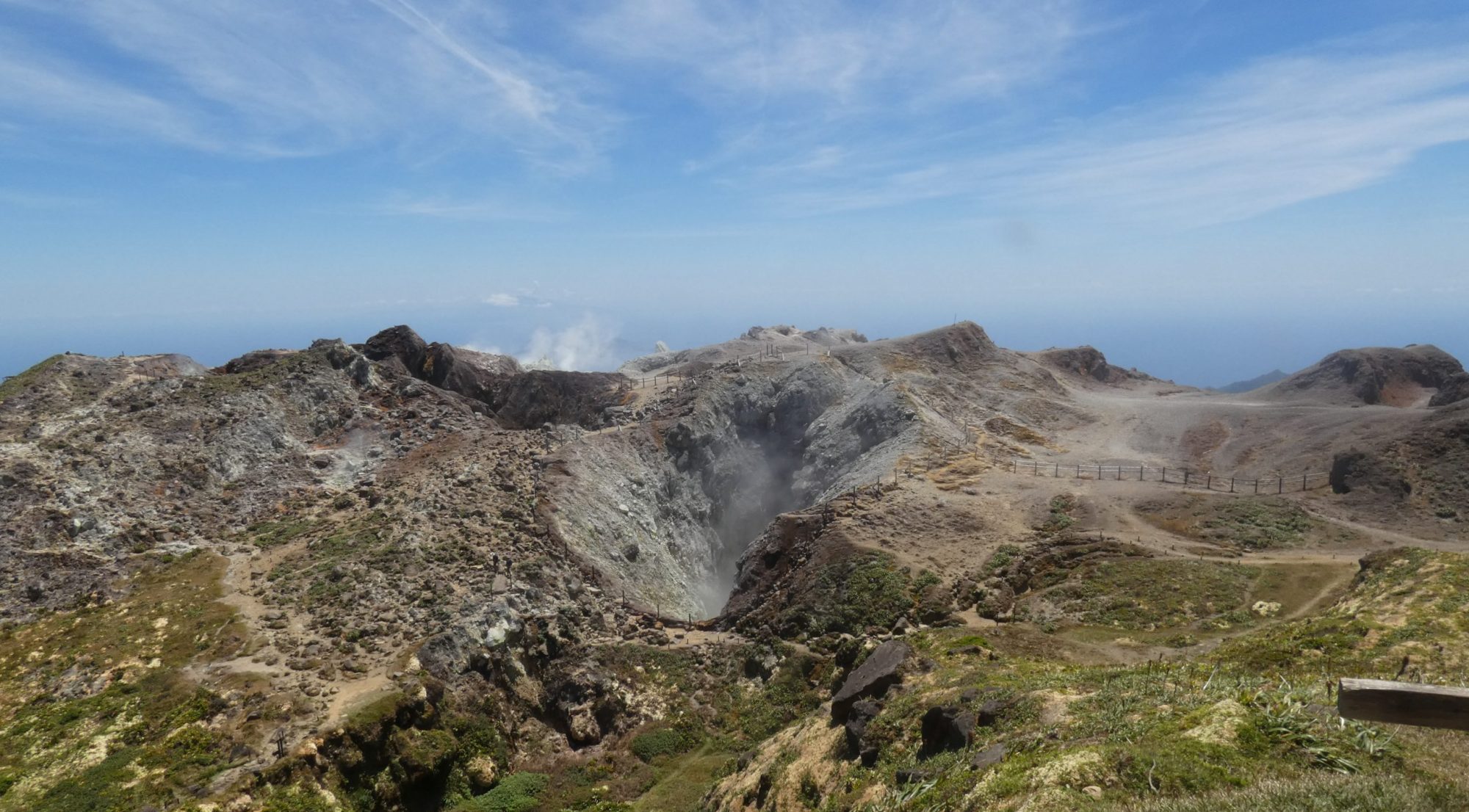We were there
The context
On Tuesday, November 14, 2023, at 2:15 p.m., the plenary meeting to launch the Regional COP (Regional Conference of the Parties) was held at the Raizet regional space. TCGNRG was there and gives you its reading of the exchanges and this new system for ecological planning
According to the Ministry of Ecology website, the Regional COP aims to « […] à décliner région par région, à l’échelle de l’action concrète, ces objectifs nationaux de réduction des émissions de gaz à effet de serre, de biodiversité, de préservation des ressources ,e d’économie circulaire et d’adaptation. »1 (“[…] to decline region by region, on the scale of concrete action, these national objectives for reducing greenhouse gas emissions, biodiversity, resource preservation, circular economy and adaptation.”)
The parties concerned are « […] les collectivités d’une part, mais aussi les entreprises, les associations et les fédérations professionnelles. »1 (“[…] communities on the one hand, but also companies, associations and professional federations.”)
The provisional calendar for the Regional COPs provides: « […] Cet hiver (décembre en Guadeloupe) : établissement d’un diagnostic partagé et co-construit avec les collectivités territoriales; Au printemps 2024 (mars-avril en Guadeloupe) : co-construction avec tous les acteurs des leviers d’action; À l’été 2024 (juin-juillet en Guadeloupe) : pour chaque COP, finalisation des feuilles de route pour l’horizon 2030, au sein du territoire. »1 (“[…] This winter (December in Guadeloupe): establishment of a shared and co-constructed diagnosis with local authorities; In spring 2024 (March-April in Guadeloupe): co-construction of action levers with all stakeholders; In the summer of 2024 (June-July in Guadeloupe): for each COP, finalization of roadmaps for 2030, within the territory.”)
The joint invitation from the prefecture and the Guadeloupe Region of November 10, 2023
calls for « […] (aujourd’hui) de construire une stratégie avec les acteurs de terrain pour élaborer un projet de territoire qui contribue aux objectifs nationaux de transition écologique » (“[…] (today) to build a strategy with field stakeholders to develop a territorial project that contributes to the national objectives of ecological transition”) through the meeting to launch ecological planning in the territory.
By organizing the launch plenary, on November 14th, Guadeloupe is the second French region to launch its COP after the Grand Est region and the first outermost region. Guadeloupe therefore wants to be at the head of the regions for ecological planning even though public transport is poorly developed, recycling is almost non-existent and aquatic environments are dramatic both chemically and ecologically. We must hope that the energy put into embracing this new body will make it possible to bring about real change and not anachronistic decision-making by a developing region applying the references of the former 6th world power.
Progress of the launch plenary
After the introductory remarks from the Prefecture, the Regional Council, the Departmental Council, the association of Mayors and the Minister in charge of Ecological Transition and Territorial Cohesion and in charge of the Territorialization of ecological planning (recorded video), three presentations were made to introduce the climatic and ecological context of Guadeloupe:
A first presentation was by a lecturer from the University of the Antilles on the climate of Guadeloupe. Unfortunately, the presentation was more focused on the work carried out by his research group than on the state of knowledge of the climate of Guadeloupe. This is undoubtedly linked to the underfunding for research, particularly on climate change, granted to the University of Antilles.
The second presentation was that of the Environment and Energy Management Agency (ADEME) Guadeloupe on the issues of climate change and the reduction of greenhouse gases. Unfortunately, this presentation was based on a political definition of the uses of biofuels and not a physical or climatic one. The switch to biofuels at the Jarry thermal power station will make it possible to consider, thanks to the political definition of renewable energies, that Guadeloupe’s electricity network will be 100% based on renewable energies by 2024-2026. In fact, this thermal power station and that of Le Moule (bagasse/wood/coal) rely on fossil and non-renewable energies. These two power plants therefore have nothing physically (i.e. climatically) green. ADEME Guadeloupe considers that the main challenge will be transport, which is true, but the matter of the electrical network and electricity production is not proportionally resolved. Questions and comments from the public on the Multi-year Energy Program (PPE) and the place given to Geothermal Energy showed the non-acceptance of the energy trajectory proposed by the Guadeloupe Region. The question of energy does not generate consensus among the population and is still far from being climatically virtuous.
The third presentation on the state of biodiversity in Guadeloupe was made by the president of the board of directors of the French Biodiversity Office (OFB). The latter is slow to establish itself as a scientific reference on biodiversity in Guadeloupe, despite its academic qualifications. Numerous questions and comments have, also for this subject, shown the population’s non-acceptance of the current management of the territory and in particular of its biodiversity.
The numerous tensions during this introduction sequence suggest that the conditions are not met for peaceful exchanges on the two issues of climate and biodiversity, both on the side of civil society which denounces a refusal of democracy and of the elected representatives of the regional majority who have difficulty accepting comments and reproaches. The recent update of the PPE and the Regional Plan for Economic Development, Innovation and Internationalization (SRDEII) showed this, leaving a strong feeling in civil society which had mobilized.
The proposals made by DEAL Guadeloupe provide that the Regional COP will work with six thematic groups which will have to work on the six themes of France Nation Verte (France Green Nation), that is to say: better housing, better travel, better protection of our ecosystems, better produce, eat better, consume better. A final group will be responsible for the synthesis. The regional COP will have to propose regional planning to meet national commitments. A list of action levers must therefore be proposed, 52 of which have already been identified by France Nation Verte (see elements of this list at the end of the document), to resolve the five environmental challenges of mitigation, adaptation, biodiversity, resource management and health by 2030.
The main question that can be asked is whether this approach has a chance of proposing a direction consistent with the physical realities of the Guadeloupe archipelago and allowing it to develop while taking its share of responsibility for the reduction of greenhouse gases and protection of (global) biodiversity.
Our analysis of the situation
Three elements may suggest that the chances are that this new approach will lead to an impasse, a waste of time and a destabilization of the governance of the Guadeloupe region.
The first element is the experience of the citizens’ climate convention. 150 citizens drawn by a lot full of goodwill who after more than nine (9) months of work made proposals full of common sense, but which did not go in the direction of power and were therefore rejected in the vast majority in the limbo of history (90%). This while not even give the French Parliament the opportunity to discuss these proposals. No one can deny that bottom-up is no longer working in the French Republic in particular since April 23, 2017. The choice to propose the establishment of Regional COPs is based on the same approach as the convention citizen for the climate: an up-bottom decision imposed and not previously discussed. Living conditions are still impacted by climate variations and the level of knowledge being the same when 2019, the chances that the proposals of the Regional COPs will be the same as those of the citizens’ climate convention are great. The proposals were not accepted in 2019, there is no reason for them to be accepted in 2024. Because even if they are declined at the regional level they will have consequences at the national level with a break with the capitalist system and trade at all costs.
The second element which suggests a waste of time is the proposed timetable and the very short deadlines. Proposing in less than six (6) months concrete, realistic and quantified ecological planning options for an archipelagic territory with so much missing information on the current and future climate is at best a sweet dream and at worst a lack of knowledge of the territory. The recurring lack of resources within public services has gradually led to a loss of skills, knowledge and capacity to act. The current situation with too partial knowledge of the territory and the inability to offer simulations on the economic, political and social consequences of decisions to reduce greenhouse gas emissions and protect biodiversity will push us to work by the rules of thumb. And therefore to return to the subject frequently to adjust what could not be planned or correctly evaluated. The Regional COP system already foresees annual updates.
The third element which suggests a destabilization of the region or even the country of Guadeloupe is the absence of peaceful social dialogue. Recent exchanges between the majorities of the Regional Council or the Departmental Council and civil society leave little optimism regarding the acceptance of common sense measures which would go against current policies but would better protect our environment and our living environment. As an example, the curious citizen can refer to the revisions of the Multi-year Energy Program (PPE) and the Regional Plan for Economic Development, Innovation and Internationalization (SRDEII).
Effective and realistic ecological planning can only be carried out through a disruption in our mode of operation leading to profound changes in the economy and political governance. The current political power does not seem disposed to too much evolution or even ecological revolution.
In conclusion
TCGNRG will participate in workshops to which we are granted access. This is not with the aim of seeking the best solutions at the regional level for planning but rather to ensure that this moment of democracy is not stolen from civil society using misused scientific concepts such as vague notions of green and renewable energies.
Solutions for a lucid and just transition already exist, we can cite among others the massive development of geothermal energy, free public transport, the reduction of meat consumption, the reduction of processed foods, the development of subsistence agriculture based on agroforestry and permaculture, the promotion of clothing styles more in line with our climate, the revision of taxation to promote the development of production and the local economy, the development of local police powers, etc.
These solutions are only rarely implemented, because they will cause a significant change in the functioning of society and the balance of power. The lobbies of the old carbon world are powerful and have no desire to lose their privileges, the results of the citizens’ climate convention are proof of this.
For TCGNRG Jean-François Marc DORVILLE (jf.dorville@tcgnrg.com)
1https://www.ecologie.gouv.fr/territorialisation-planification-ecologique-christophe-bechu-lance-premiere-cop-regionale-metz-mardi
Annex
A non-exhaustive list of levers identified in the document Act better, ecological planning, summary of the plan, July 2023 (Mieux agir, la planification écologique, synthèse du plan, juillet 2023)


